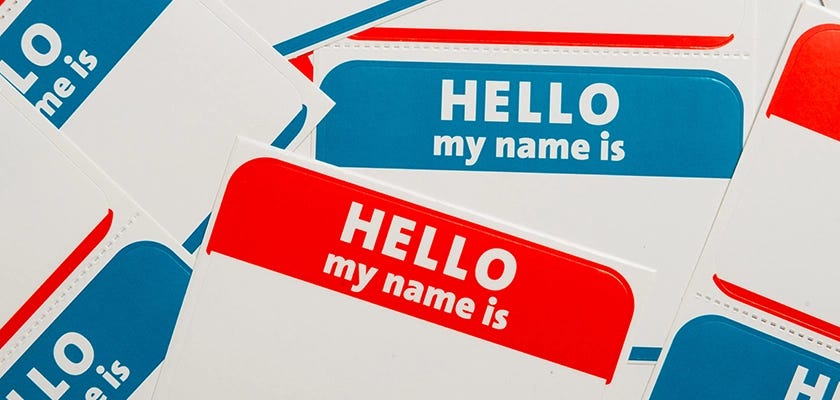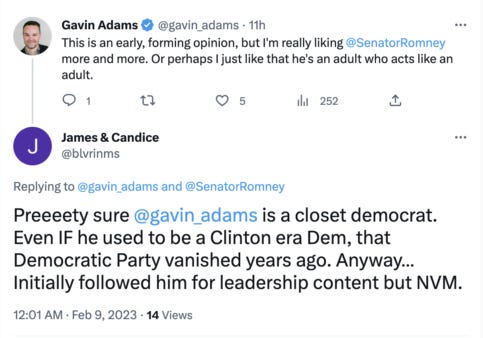5 Smarter Ways to Use Labels (Without Limiting People)
How have you labeled the people around you?
And before you suggest to yourself, “I don’t label people,” we all do it. Our brains are wired to label.
Throughout my life, others have labeled me. And I’ve labeled others my entire life.
A Quick Labeling Story From Social Media…
I enjoy political banter. I’m fascinated by the sociology of politics. And I’m typically disgusted by politicians.
During the Biden presidency, I posted something on social media after a State of the Union address and the GOP rebuttal.
Before I show you what I said AND one response I received, can I quickly ask: What labels are you already mentally placing on me?
Perhaps none. Or at least nothing new. You may have already labeled me. Some will label me “liberal” because I used the term “President” Biden, not “Brandon” or another nickname. It’s so easy to label because it helps our brain make sense of the world.
Why We Label…
Psychologically, we label what we don’t understand to help us compartmentalize. Labels help us manage uncertainty. Think of it like an imperfect mental shortcut. We do this unconsciously. Our labels are all constructed from our presuppositions, biases, and stereotypes. By labeling, we can categorize the unknown person in front of us into a compartment where we’ve placed other people of similar characteristics.
This doesn’t make you a lousy leader or a person of below-average quality. It just means you’re human. Our brains seek clarity, so giving people a label helps us understand what we don’t yet understand.
The Problem Is…
Of course, there’s a massive inherent problem with our labeling. Because we label what we still need to fully understand, we may accidentally and inaccurately mislabel. We often do. When we meet a person with a big personality, we might label them like the other people in our life who seem similar to them. When we meet a person of a different race, we categorize them based on our previous experiences with that race. When we read a social post, we categorize the person based on their language, comparing it to that of others we’ve seen use similar language.
Labels allow us to make sense of those around us. Yet mislabeling provides counterfeit clarity.
I mentioned a post that caused a person to label me.
After President Biden’s State of the Union (SOTU) address in 2023, the GOP offered its rebuttal. And in typical fashion, the opposing party used predetermined talking points to “label” democrats and Biden. President Biden also didn’t hold his labels back when talking about the Republicans.
As I browsed the chaos of social media, I came across some news about Senator Mitt Romney. Before the speech, he apparently gave a fellow republican an earful. This led me to read more, which in turn led to his non-official rebuttal. I loved what he said. Mainly because it wasn’t full of misrepresentations. He was honest, fair, and behaved like an adult. It was refreshing.
So I posted… and was immediately labeled:
I don’t personally know James and Candice. I don’t believe they know me, but they needed to categorize me in an attempt to understand me. These people were following my leadership content until a potential political viewpoint overshadowed it for them.
That reality is a topic for another day… for now, let’s discuss how to manage our need to label.
5 Tips for Better Labeling…
When we label people prematurely, we harm their leadership progress, career, and joy.
Ideally, we could stop labeling in totality, but that’s impossible. It’s too subconscious. We can do something, though.
When we interact with a new person, interview people for an open position, or interact with someone in our congregation or customer base, here are a few tips to better use our internal label maker:
1. Use “PENDING” as your first label.
As I said, we can’t not label. So, rather than fight our brain, let’s use an interim label: “PENDING.”
By intentionally refusing to pigeonhole a person with a potentially inaccurate label, we can label them with a question mark. Sure, we know people like them, and we’ve labeled people like them before, but what if the person we just met isn’t like those other people?
Rather than mislabeling or fighting not to label, let’s assign a temporary tag.
Keep reading with a 7-day free trial
Subscribe to Gavin’s Substack to keep reading this post and get 7 days of free access to the full post archives.



